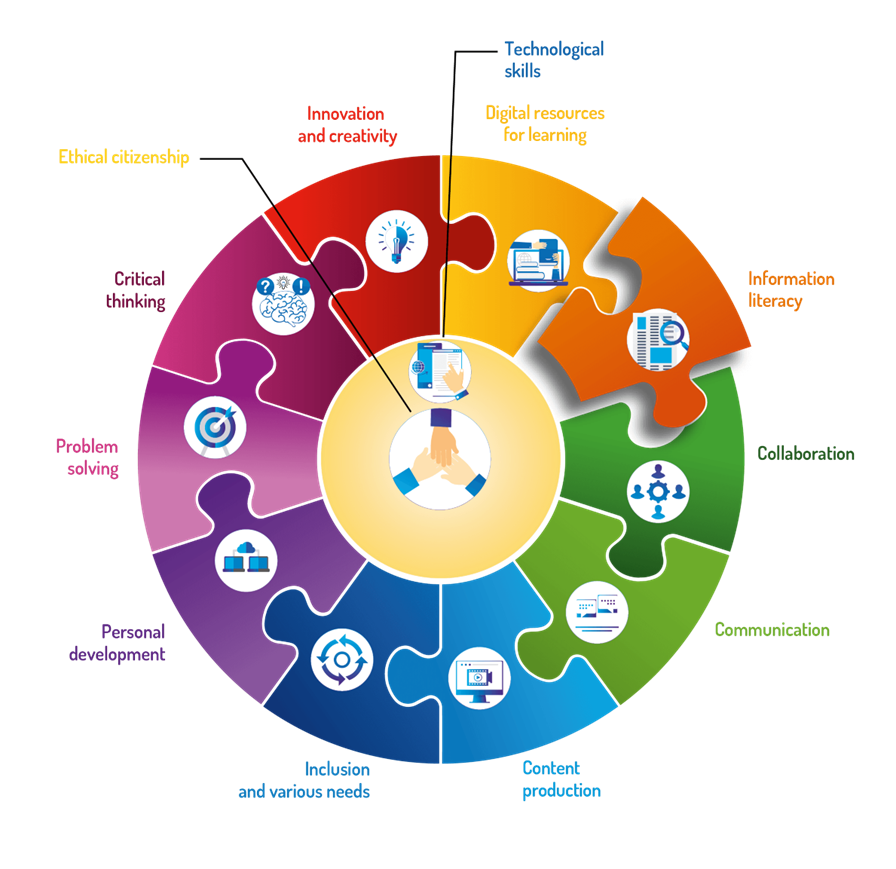Programs and courses
Numerical competence
Information Literacy – Searching information
In April 2019, the Ministère de l’Éducation issued a Digital Competency Framework to develop our digital skills. This framework was defined by a set of skills related to the confident, critical, and creative use of digital technology to achieve learning objectives. It consists of 12 dimensions.
By the end of this training, participants will be able to plan their research, develop strategies to research information, assess the information’s quality and reliability by cross-checking sources, in addition to note and cite authors. They will also be able to organize and classify information to be able to recover it at a later time.
Asynchronous training: Training modules are available online at any time for the duration of your access. A memory aid is provided for printing on the platform.
Course content
Part 1 – General presentation
This presentation, featuring Nathalie R. Bernier, provides the following:
- How to select information and effectively use search engines;
- How to critically assess digital information to determine the credibility and reliability of sources and content;
- How to adopt a reflective attitude on information and its uses.

Part 2 – Specific training
A presentation explaining how to develop and mobilize information literacy.
Summary
Once reserved for specialists, accessibility to information has been democratized and rapidly expanded, at the risk of overwhelming its users. Today, the sheer number of resources results in the varying degrees of reliability being levelled out, potentially leading to rapid oversight and harmful information. Therefore, developing and mobilizing information literacy are required in a context of information overload.
Content
Three (3) teaching modules to prepare the participant:
- Module 1: Planning Research
- Module 2: Researching and Evaluating
- Module 3: Organizing and Referencing
Module 1: Planning Research
| Module 2: Researching and Evaluating
|
Module 3: Organizing and Referencing
|
|
|
Evaluation and certification
A certificate will be issued at the participant’s request at the end of the training following successful completion of the assessment.
Target audience
The training is intended for individuals, professionals, companies, and anyone else who wants to develop and mobilize information literacy to ask the right questions and acquire good practices.
Trainers
Nathalie R. Bernier – General presentation
Nathalie Faure – Specific training
CEGEPs offering this course
Cégep de Chicoutimi (Humanis)Cégep de Sherbrooke
Cégep de Lanaudière
Cégep de Lévis
Cégep Marie-Victorin
Cégep de l'Outaouais
Cégep de Saint-Hyacinthe
Cégep de Trois-Rivières
Cégep du Vieux Montréal
Cégep de l'Abitibi-Témiscamingue
Cégep Baie-Comeau
Cégep de Drummondville
cégep Édouard-Montpetit
Cégep Gérald-Godin
Cégep de Jonquière (Mastera)
Cégep Lionel-Groulx
Centre d'études collégiales de Montmagny
Cégep de Saint-Jérôme
Cégep Sorel-Tracy
Cégep de Valleyfield
Cégep de Granby
École haïtienne sans frontières
Centre de services scolaire des Laurentides
Collège d'Alma (Entreprises et collectivités)
Collège Montmorency
Centre d'études collégiales de Forestville
Cégep de Shawinigan
Cégep de Saint-Félicien
Centre de formation C-Formatel
Anima
Gestion virtuelle MP


